 PS Classics has just released the debut solo CD of Jessica Molaskey,
Pentimento, which is perhaps the strongest and most enjoyable solo
album of the year. The CD features a collection of 16 depression era songs
and two songs written by Jessica and her husband, John Pizzarelli (who
also plays guitar and duets with Jessica on "We're In the Money"), which
combine into a remarkably topical album given the current situation on
Wall Street. The inclusion of many an obscure verse ads to one's
comprehension that these songs were truly used to get people through
difficult times, usually with tongue firmly in cheek and a sense of irony
resolutely in place (although the lack of inclusion of the verse to "I'm
Always Chasing Rainbows," with its oh-so-appropriate lyrics is a mystery). PS Classics has just released the debut solo CD of Jessica Molaskey,
Pentimento, which is perhaps the strongest and most enjoyable solo
album of the year. The CD features a collection of 16 depression era songs
and two songs written by Jessica and her husband, John Pizzarelli (who
also plays guitar and duets with Jessica on "We're In the Money"), which
combine into a remarkably topical album given the current situation on
Wall Street. The inclusion of many an obscure verse ads to one's
comprehension that these songs were truly used to get people through
difficult times, usually with tongue firmly in cheek and a sense of irony
resolutely in place (although the lack of inclusion of the verse to "I'm
Always Chasing Rainbows," with its oh-so-appropriate lyrics is a mystery).
Jessica has a winsome voice that caresses each note and lyric. Those used
to hearing her powerful belt (featured on Jason Robert Brown's Songs
for a New World and Parade) will not recognize the laid-back
manner she displays on this album to remarkable effect. Molaskey is backed
by a killer combo that, in addition to her husband, includes Bucky and
Martin Pizzarelli, Larry Goldings, and Ken Peplowski; all of whom manage
to impart a unique feel to each song, yet remain true to a unified mood
throughout the album. This is an incredible CD and sure to be on
everybody's 'Best of 2002' list.
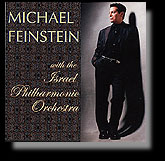 Lately I've noticed something odd about Michael Feinstein, who recently
released his latest CD, Michael Feinstein with the Israel Philharmonic
Orchestra
. It seems that while his voice has been steadily improving
and gaining strength, the spark that made his earlier albums such a joy
has been gradually diminishing. While his newest album, a collection of
American classics (all written by Jewish composers, appropriately enough
given his instrumentalists), is a lush treat for the ears, to quote
Dorothy Parker, 'there's just no there there.' For some reason, the
emotional connection and sense of fun present on his earlier albums
(Live At The Algonquin and Isn't It Romantic in particular)
and experienced during his live performances are missing almost entirely
from this album. Nowhere is this more apparent than on the
oh-so-often-recorded film noir song, "Laura." Feinstein's version starts
with the chorus rather than with the verse, and is beautiful but somewhat
bland. It isn't until he breaks into the verse midway through the song
that the old magic starts to exert itself as the emotions reconnect with
his voice. That old black magic starts in again on a live recording of "I
Won't Send Roses" (recorded on Isn't It Romantic as well), which
demonstrates why he may be best experienced live. In addition, while
Feinstein's voice has gained polish and strength, it does get overwhelmed
at times by the 80+ piece orchestra, especially on the big brassy numbers
like "The Best Is Yet To Come." Lately I've noticed something odd about Michael Feinstein, who recently
released his latest CD, Michael Feinstein with the Israel Philharmonic
Orchestra
. It seems that while his voice has been steadily improving
and gaining strength, the spark that made his earlier albums such a joy
has been gradually diminishing. While his newest album, a collection of
American classics (all written by Jewish composers, appropriately enough
given his instrumentalists), is a lush treat for the ears, to quote
Dorothy Parker, 'there's just no there there.' For some reason, the
emotional connection and sense of fun present on his earlier albums
(Live At The Algonquin and Isn't It Romantic in particular)
and experienced during his live performances are missing almost entirely
from this album. Nowhere is this more apparent than on the
oh-so-often-recorded film noir song, "Laura." Feinstein's version starts
with the chorus rather than with the verse, and is beautiful but somewhat
bland. It isn't until he breaks into the verse midway through the song
that the old magic starts to exert itself as the emotions reconnect with
his voice. That old black magic starts in again on a live recording of "I
Won't Send Roses" (recorded on Isn't It Romantic as well), which
demonstrates why he may be best experienced live. In addition, while
Feinstein's voice has gained polish and strength, it does get overwhelmed
at times by the 80+ piece orchestra, especially on the big brassy numbers
like "The Best Is Yet To Come."
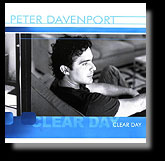 In his bio, Peter Davenport lists no less than six careers that have
made up his life. This diversity is also represented on his debut CD,
Clear Day, which encompasses a wide range of musical styles: jazz,
Latin, Broadway belt and modern pop. However, he may have been better off
knowing his strengths and focusing on the material and styles that
effectively showcase them. Davenport possesses a light, lyric voice that
comes to dynamic life on the lighter jazz songs ("On A Clear Day" and "I
Thought About You" are simply 'make you melt' romantic) and Latin-inspired
numbers (a delightful "Come Rain Or Come Shine" and an inspired pairing of
"The Sweetest Sounds" and "So Nice"). When he sticks to those two musical
genres, the album is incredibly sensual. However, when he strays into
places where his voice is not as equally suited (the belty "First You
Dream" by Kander and Ebb) or switches to a pop vein (which is primarily
represented by songs composed by Davenport), the romantic spell is
splintered. As this flaw encompasses only four out of his twelve tracks,
however, it is not an insurmountable problem (and a reason why God created
the 'skip' button, after all). In his bio, Peter Davenport lists no less than six careers that have
made up his life. This diversity is also represented on his debut CD,
Clear Day, which encompasses a wide range of musical styles: jazz,
Latin, Broadway belt and modern pop. However, he may have been better off
knowing his strengths and focusing on the material and styles that
effectively showcase them. Davenport possesses a light, lyric voice that
comes to dynamic life on the lighter jazz songs ("On A Clear Day" and "I
Thought About You" are simply 'make you melt' romantic) and Latin-inspired
numbers (a delightful "Come Rain Or Come Shine" and an inspired pairing of
"The Sweetest Sounds" and "So Nice"). When he sticks to those two musical
genres, the album is incredibly sensual. However, when he strays into
places where his voice is not as equally suited (the belty "First You
Dream" by Kander and Ebb) or switches to a pop vein (which is primarily
represented by songs composed by Davenport), the romantic spell is
splintered. As this flaw encompasses only four out of his twelve tracks,
however, it is not an insurmountable problem (and a reason why God created
the 'skip' button, after all).
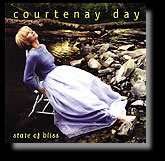 Courtney Day's latest album, State of Bliss, is one of the most
intelligently sung albums I have heard in recent memory. Listening to the
CD, one clearly gets the impression that every lyric is well thought out
and contains personal relevance; an element most refreshing to hear. Her
interpretation of "Beyond Compare," one of the most intelligent numbers
ever written (and one that, sadly, gets little attention) is beyond
superb. Courtney Day's latest album, State of Bliss, is one of the most
intelligently sung albums I have heard in recent memory. Listening to the
CD, one clearly gets the impression that every lyric is well thought out
and contains personal relevance; an element most refreshing to hear. Her
interpretation of "Beyond Compare," one of the most intelligent numbers
ever written (and one that, sadly, gets little attention) is beyond
superb.
Day's voice is also extraordinarily refreshing and unique, possessing a
'baby-doll' quality similar to Blossom Dearie and Bernadette Peters, but
sans the hints of sly, twisted understanding that underlies those
performers. And therein lies one of the drawbacks to the album; while
intellectually Day is able to grasp the complexities and the darker side
of the songs, her voice, as refreshing and youthful as a fine spring day,
works counter to said elements. Thus, "A Time For Love" and "Something
Cool" lack the final payoff that a more world-weary voice would bring.
This dichotomy works wonderfully, however, with "What Are You Doing The
Rest Of Your Life?", in which the song's minor melody and Day's optimistic
sound make for a delightful juxtaposition.
Even though the two aforementioned songs lack full payoff, they are
well thought out and executed, as is the majority of the album, which
contains a great mix of old standards and newer material. Only one track
provides a major disappointment and in this listener provoked such a
visceral reaction that I had to take a break from the album. In lesser
albums, a flawed track is easily overlooked and ignored, but Day has woven
such a fine and supple web with State Of Bliss that this one track
was enough to unravel the warp and woof of the entire CD. Oddly enough,
the track contained two songs that should work well together, at least
musically; Sondheim's "Take Me To The World" and "Anyone Can Whistle."
For some odd reason, the two songs do not gel, largely due to the
arrangement. Day is simply stunning on "Take Me To The World," which
perfectly showcases her voice and sensibilities. However, the transition
into "Whistle" is jarring; the effect given is that she went off-key in
the process. The key in which she ends up does not fit her voice and
provides the only spot on the album where she becomes shrill and belty. In
addition, the key also forces her to sing an alternate melody line upon
her return to "Take Me To The World," one that works against the song and
our expectations.
While I urge you to buy the album, I urge you with equal fervor to skip
the track (at least the first time you listen to it) to more fully enter
Day's State of Bliss.
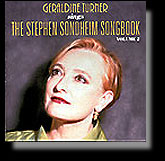 Australian performer Geraldine Turner has an association with the music
of Stephen Sondheim that dates back to 1973, when she performed Petra in
the Australian premier of A Little Night Music. Down under, she has
also been featured in Sweeney Todd (Mrs. Lovett), Into The
Woods (The Baker's Wife), Company (Joanne), and revisited A
Little Night Music as Desiree. In 1986, she was one of the first
performers to devote an entire album to Sondheim songs, which has recently
been followed up with Geraldine Turner Sings The Stephen Sondheim
Songbook - Volume 2. Australian performer Geraldine Turner has an association with the music
of Stephen Sondheim that dates back to 1973, when she performed Petra in
the Australian premier of A Little Night Music. Down under, she has
also been featured in Sweeney Todd (Mrs. Lovett), Into The
Woods (The Baker's Wife), Company (Joanne), and revisited A
Little Night Music as Desiree. In 1986, she was one of the first
performers to devote an entire album to Sondheim songs, which has recently
been followed up with Geraldine Turner Sings The Stephen Sondheim
Songbook - Volume 2.
Turner is extremely adept at getting under the skin of a song and
bringing out every nuance of a lyric. She is also a highly theatrical
singer of the old 'belt' variety, which is, at times, a refreshing change.
The songs are nicely balanced between touching and/or intense ballads
("Take Me To The World," "Not A Day Goes By," "No More/Moments In The
Woods" and "Send in the Clowns") to lighter comic fare ("Pretty Little
Picture," "Can That Boy Fox Trot") to tour-de-force knock 'em dead numbers
("I'm Still Here" and an incredible "Rose's Turn" that hopefully will lead
some smart director or producer to cast her in a production of
Gypsy ASAP).
 It is astonishing that while Kurt Weill's music has been a staple of
cabaret albums, few, if any, jazz performers have devoted an entire album
to his work. With his chord structures, intricate yet intuitive melodies,
and lyrics (by a variety of lyricists) that tackle love, murder, drugs and
other outright decadences, Weill's songs just cry out for jazz treatment.
Luckily, Dee Dee Bridgewater (who won a Tony for playing Glinda in The
Wiz) has remedied the situation with an outstanding album, This Is
New
. Based on Kurt Weill: A Work In Progress, a show she
performed at the Montreal Jazz Festival in 2000, Bridgewater brings a
light jazz sensibility to eleven of Weill's songs, managing to retain the
lyrical sensibilities and a majority of the melody in the process. It is astonishing that while Kurt Weill's music has been a staple of
cabaret albums, few, if any, jazz performers have devoted an entire album
to his work. With his chord structures, intricate yet intuitive melodies,
and lyrics (by a variety of lyricists) that tackle love, murder, drugs and
other outright decadences, Weill's songs just cry out for jazz treatment.
Luckily, Dee Dee Bridgewater (who won a Tony for playing Glinda in The
Wiz) has remedied the situation with an outstanding album, This Is
New
. Based on Kurt Weill: A Work In Progress, a show she
performed at the Montreal Jazz Festival in 2000, Bridgewater brings a
light jazz sensibility to eleven of Weill's songs, managing to retain the
lyrical sensibilities and a majority of the melody in the process.
Sounding more than a little like jazz great Dianne Reeves, Bridgewater
delivers most of the songs in a slow, sultry manner. Her "Lost In The
Stars" is an absolute delight, and she shines on such classics as "My
Ship" and "Speak Low." While "Alabama Song" breaks from that sultry
groove a bit too much for my taste, the bossa nova flavored "Bilbao Song"
is infectious and "The Saga of Jenny," with its playful mix of styles and
tempos, gives great attitude.
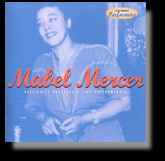
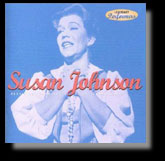 |
Harbinger Records has released two albums featuring previously
unrecorded live performances by two of the most beloved voices in cabaret
and musical theater: Mabel Mercer and Susan Johnson. While both are
beloved by fans of their respective genres, neither performer truly
received the mainstream recognition they deserved and the CDs are a
welcome visit with these dynamic singers.
Considered to be the patron saint of cabaret, Mabel Mercer is
essentially a 'singer's singer' whose attention to lyrics and storytelling
is legendary. Legendary Performers: Mabel Mercer is a delightful
collection of twenty-three numbers recorded live during performances in
the '60s. Fifteen of the songs are showtunes, and are a delightful mix of
the known (a playfully wry "I Feel Pretty," a heartfelt "Once Upon A
Time," and a tender "More I Cannot Wish You") and the more obscure (a
gleeful "Days Gone By" from She Loves Me, an incredibly well-acted
"Mira" from Carnival! and a joyful "Merely Marvelous" from
Redhead - a number that should be rediscovered). The visual image
she conjures with "Lazy Afternoon" provides a virtual master class in
storytelling technique, and her rendition of Cole Porter's "Ev'ry Time We
Say Goodbye" is an exercise in subtle heartbreak. While some of the songs
suffer from source material problems, and others contain the occasional
vocal bobble, Mercer's impeccable phrasing and interpretive abilities
shine through.
Susan Johnson is one of the most fondly remembered Broadway performer
of the '50s; much more so than her limited output of albums would suggest.
Her voice, an incredibly lush mezzo that envelopes the listener like a
velvet wrap, was adept at handling comic numbers and ballads equally.
Best known for originating the sarcastic best friend, Cleo, in The Most
Happy Fella, Johnson's Broadway career was sidelined due to a
combination of a horrible traffic accident in 1963 and her focus on family
after getting married in 1964.
Legendary Performers: Susan Johnson
contains 26 songs grouped as medleys by songwriters Irving Berlin, Frank
Loesser, Cole Porter, Johnny Burke and Richard Rodgers. This is
definitely a must-have album for theater lovers. To hear Johnson's voice
caress every note and wring every emotion out of Berlin's "Remember" and
Burke's "But Beautiful" is worth the price of the album alone. To hear the
sheer reckless joy she brings to Loesser's "If I Were A Bell" or the
knowingly sardonic manner she imparts on Rodgers' "I Wish I Were In Love
Again" is just further icing on an incredible cake.
 If any performer is going to assume the mantel of the second (or third)
generation to embody "I'm Still Here," it would be Donna McKechnie. With
a career that spans five decades, during which she worked with Broadway's
top composers and choreographers, and having originated one of the most
iconographic characters in Musical Theater, she certainly has plenty of
material upon which to draw for an autobiographical show. One such show,
My Musical Comedy Life, which was a hit at Arci's last year, was
recorded live by Fynsworth Alley and turned into a CD entitled Donna
McKechnie: Inside The Music
. If any performer is going to assume the mantel of the second (or third)
generation to embody "I'm Still Here," it would be Donna McKechnie. With
a career that spans five decades, during which she worked with Broadway's
top composers and choreographers, and having originated one of the most
iconographic characters in Musical Theater, she certainly has plenty of
material upon which to draw for an autobiographical show. One such show,
My Musical Comedy Life, which was a hit at Arci's last year, was
recorded live by Fynsworth Alley and turned into a CD entitled Donna
McKechnie: Inside The Music
.
For the most part, the show, which
incorporated copious amounts of dance amidst the personal storytelling,
transfers well onto disc. The first twelve minutes, unfortunately, belay
that due to two medleys that become stupefying on disc, containing, as
they do, snippets of over a dozen songs that fail to gel into a unified
whole or sustain an emotional arc. The show comes to vibrant life once McKechnie starts talking about her
life and singing full songs that serve to expand upon her life stories.
Her wistful ode to Astaire is delightfully punctuated by a tale of her
meeting of her idol. A song series illustrating a painful relationship
hits the right notes of pathos ("Lies of Handsome Men," "Guess Who I Saw
Today?" and "Where Do You Start") before launching into a celebratory
story of freedom from said handsome man, which culminates into a bravura
medley that includes "Everybody Says Don't" and "I Am Easily Assimilated."
While a few of the songs are no longer in her range and are a bit painful
to hear (specifically "Turkey Lurkey Time" from Promises Promises),
for the most part she sounds grand. Two obscure songs, Kleban's "Broadway
Boogie Woogie Blues" and "Inside The Music" (which was replaced by the
much more suitable "The Music And The Mirror" for A Chorus Line)
will delight theater fans.
 A reader in German brought my attention to an album entitled Tire
Tracks, by Kenneth Posey, an American performer who is
currently starring in Jekyll & Hyde in Germany. Singing two songs
each from Whistle Down The Wind, Aida, and The Rocky Horror Show
(none, oddly enough, from Jekyll & Hyde), Posey has a strong rock/pop
tenor that is surprisingly expressive. He is joined by Leah delos Santos
("Elaborate Lies" from Aida, "A Kiss Is A Terrible Thing To Waste"
and "Tire Tracks and Broken Hearts" from Whistle Down The Wind;
that latter of which I still have a hard time listening to and not
inserting the original 'capped teeth and Caesar salad' lyrics into) and
Sascha Th. G. Krebs ("Like Father Like Son" from Aida). As the
album is only six songs in length, it is hard to recommend tracking it
down at Footlight Records, especially since it is an import. However,
there is no denying that Posey is an exciting singer and a performer to be
on the look out for. The album does contain a few multimedia extras, chief
of which is a video of Posey performing "Come Rain or Come Shine" that
demonstrates his faculty with a kinder, gentler ballad. A reader in German brought my attention to an album entitled Tire
Tracks, by Kenneth Posey, an American performer who is
currently starring in Jekyll & Hyde in Germany. Singing two songs
each from Whistle Down The Wind, Aida, and The Rocky Horror Show
(none, oddly enough, from Jekyll & Hyde), Posey has a strong rock/pop
tenor that is surprisingly expressive. He is joined by Leah delos Santos
("Elaborate Lies" from Aida, "A Kiss Is A Terrible Thing To Waste"
and "Tire Tracks and Broken Hearts" from Whistle Down The Wind;
that latter of which I still have a hard time listening to and not
inserting the original 'capped teeth and Caesar salad' lyrics into) and
Sascha Th. G. Krebs ("Like Father Like Son" from Aida). As the
album is only six songs in length, it is hard to recommend tracking it
down at Footlight Records, especially since it is an import. However,
there is no denying that Posey is an exciting singer and a performer to be
on the look out for. The album does contain a few multimedia extras, chief
of which is a video of Posey performing "Come Rain or Come Shine" that
demonstrates his faculty with a kinder, gentler ballad.
-- Jonathan Frank
Make sure you check our list of Upcoming Releases.
|
|

